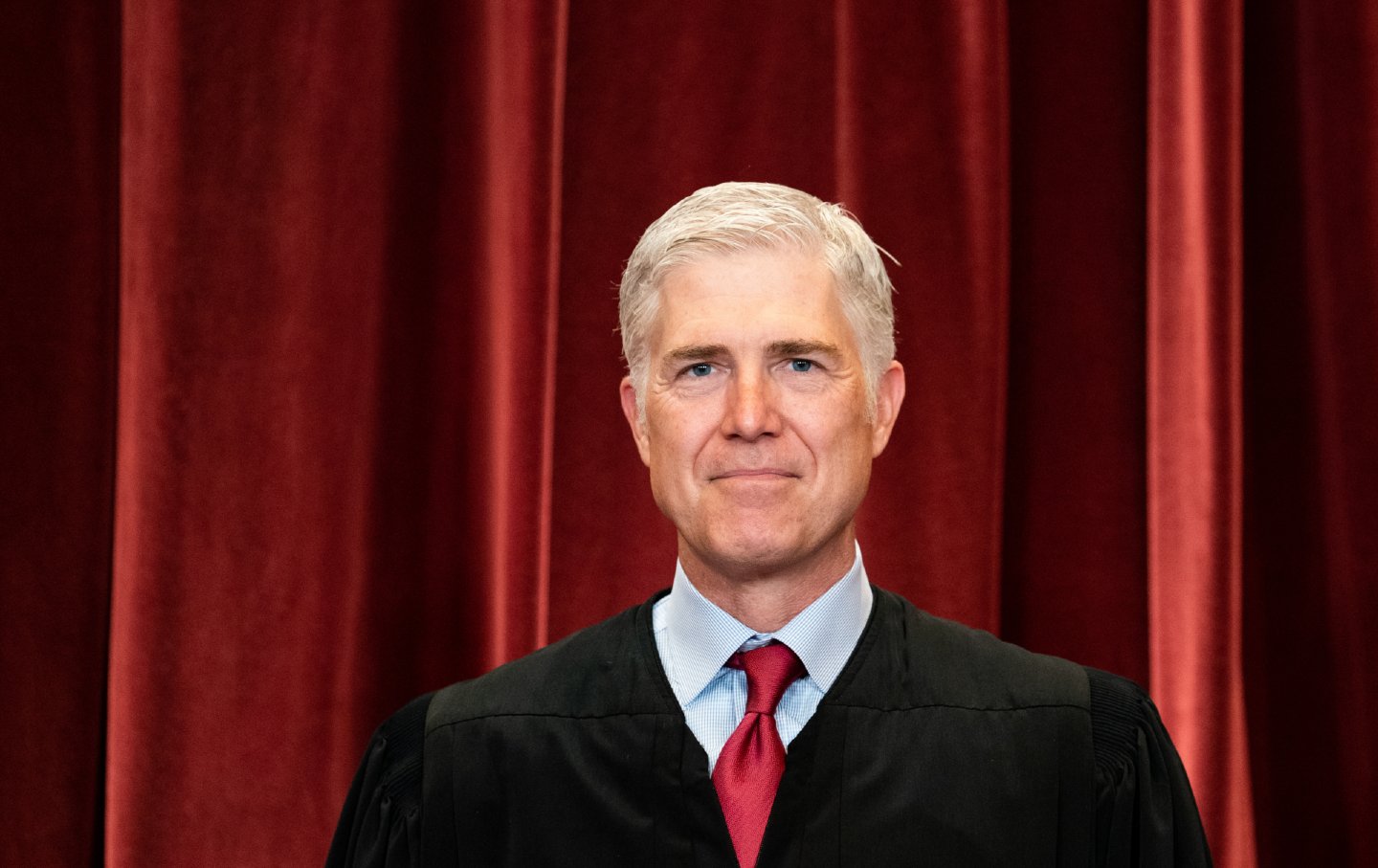Memo to Biden Admistration Policy Dissidents: Don’t Mourn. Resign.
The best thing staffers frustrated by the president’s policy in the Israel-Gaza war can do is quit.

Working in the American national security state is never an easy job for people with ethical scruples—but it has become all the more difficult lately. The Biden administration has given nearly full-throttle support to Israel’s bombing campaign in Gaza, which in its first few days took hundreds of civilian lives. This support has been only mildly tempered by rhetorical provisos warning Israel about obeying international law and cautioning against the risks of a ground invasion. But these words are just lip service to human rights. They stand in stark contrast to the administration’s deeds: protecting Israel from international condemnation in the United Nations and ramping up military aid.
Many who work in the Biden administration, particularly in the State Department, are experiencing a crisis of conscience comparable to the one endured during the George W. Bush era. By only weakly criticizing Israel while giving it a de facto blank check, the United States is undermining all its claims on behalf of human rights and the so-called liberal international order.
On October 17, senior State Department official Josh Paul resigned from his post. In his resignation letter, Paul described Hamas’s actions as a “monstrosity of monstrosities” but argued that “the response Israel is taking, and with it the American support both for that response, and for the status quo of the occupation, will only lead to more and deeper suffering for both the Israeli and the Palestinian people.”
Paul is not alone in his fear that the Biden administration is planting the seeds of future violence—including the possibility of the United States’ direct engagement in another Middle Eastern war. Paul later told The New York Times that he received many private messages in response to his resignation saying, in effect, “We feel similarly and understand.”
On October 18, HuffPost reported that “several U.S. officials” have complained off the record that “it has become difficult to have a full debate within [Biden’s] administration about what’s happening in Israel-Palestine—and in particular that people who want to talk about Israeli restraint or humanitarian protections for Palestinians feel stifled.” Government officials with a Muslim background feel particularly silenced.
One career civil servant told HuffPost: “I’m trying to educate people about Palestine through social media, but I’m worried I’ll lose my security clearance for criticizing the president or blaming the U.S. for civilian massacre. I feel like there’s no place for me in America anymore, and I’m on thin ice with my clearance because of my heritage and because I care about my people dying.”
This sentiment was echoed by a staffer in the administration: “There is a sense that the administration’s policy decisions show stunning disregard for innocent Palestinians—and that same dehumanization is also reflected in how staff are being treated.”
People of conscience in the administration and civil service have several options. They can continue leaking their discontent. If they see evidence of the government supporting war crimes, they can become whistleblowers.
But the final option they should consider is simply to follow the path of Josh Paul and resign.
A mass of resignations by government officials and White House staffers might prompt a real political debate on the Biden administration’s morally compromised and reckless policies.
Unlike other advanced democracies, the United States does not have a robust tradition of public officials resigning in protest. In 1915, William Jennings Bryan resigned as secretary of state in objection to Woodrow Wilson’s foreign policy, which Bryan rightly believed was leading the United States into the First World War. In 1973, when Richard Nixon wanted to fire the special prosecutor Archibald Cox in order to shut down the investigation into the Watergate scandal, Attorney General Elliot Richardson and Deputy Attorney General William Ruckelshaus resigned. In 2018, James Mattis resigned as secretary of defense in protest over Donald Trump’s Syria policy.
But we remember these resignations precisely because they are so rare. By contrast, countless government officials have gone along with ethically dubious policies for a host of reasons: job security and the fear of losing future employment opportunities, political partisanship, and the desire to be a team player.
Popular
“swipe left below to view more authors”Swipe →In 1975, in the wake of the Vietnam War and Watergate, the political scientists Edward Weisband and Thomas M. Franck published a study titled Resignation in Protest. They noted that the United States has a political culture “that fosters conformity rather than conviction, group loyalty rather than individual accountability, that borrows its terminology from the language of corporate athletics—in which a man’s willingness to ‘play ball’ is his true measure—rather than from moral ethics.”
In 1946, Dean Acheson, soon to be named secretary of state, said that “the most exclusive club in America” is “the club of men in public life who have resigned in a cause of conscience.” At the time, Acheson could think of only two members of that club.
It’s an exclusive club precisely because of the incentive structure created by official Washington. Those who resign from the Biden administration in protest will face ostracism from the political elite and undying enmity from their former colleagues. Their job prospects will be blighted. Conversely, those who go along with immoral policies will continue to flourish, as the McNamaras, the Kissingers, and indeed the Tony Blinkens have continued to prosper after supporting criminal wars.
The price of resignation is high. Yet consider the price of not resigning—doing nothing to halt a human rights catastrophe or prevent the United States from being caught in another war in the Middle East. Given these stakes, resignation in protest is the only honorable course.
Disobey authoritarians, support The Nation
Over the past year you’ve read Nation writers like Elie Mystal, Kaveh Akbar, John Nichols, Joan Walsh, Bryce Covert, Dave Zirin, Jeet Heer, Michael T. Klare, Katha Pollitt, Amy Littlefield, Gregg Gonsalves, and Sasha Abramsky take on the Trump family’s corruption, set the record straight about Robert F. Kennedy Jr.’s catastrophic Make America Healthy Again movement, survey the fallout and human cost of the DOGE wrecking ball, anticipate the Supreme Court’s dangerous antidemocratic rulings, and amplify successful tactics of resistance on the streets and in Congress.
We publish these stories because when members of our communities are being abducted, household debt is climbing, and AI data centers are causing water and electricity shortages, we have a duty as journalists to do all we can to inform the public.
In 2026, our aim is to do more than ever before—but we need your support to make that happen.
Through December 31, a generous donor will match all donations up to $75,000. That means that your contribution will be doubled, dollar for dollar. If we hit the full match, we’ll be starting 2026 with $150,000 to invest in the stories that impact real people’s lives—the kinds of stories that billionaire-owned, corporate-backed outlets aren’t covering.
With your support, our team will publish major stories that the president and his allies won’t want you to read. We’ll cover the emerging military-tech industrial complex and matters of war, peace, and surveillance, as well as the affordability crisis, hunger, housing, healthcare, the environment, attacks on reproductive rights, and much more. At the same time, we’ll imagine alternatives to Trumpian rule and uplift efforts to create a better world, here and now.
While your gift has twice the impact, I’m asking you to support The Nation with a donation today. You’ll empower the journalists, editors, and fact-checkers best equipped to hold this authoritarian administration to account.
I hope you won’t miss this moment—donate to The Nation today.
Onward,
Katrina vanden Heuvel
Editor and publisher, The Nation
More from The Nation


The Supreme Court Has a Serial Killer Problem The Supreme Court Has a Serial Killer Problem
In this week's Elie v. U.S., The Nation’s justice correspondent recaps a major death penalty case that came before the high court as well as the shenanigans of a man who’s angling...

Corporate Democrats Are Foolishly Surrendering the AI Fight Corporate Democrats Are Foolishly Surrendering the AI Fight
Voters want the party to get tough on the industry. But Democratic leaders are following the money instead.

Marching Against a Corrupt Regime Marching Against a Corrupt Regime
People taking to the streets for democracy.

It Would Be Madness to Give Trump and His Toadies Even More Power It Would Be Madness to Give Trump and His Toadies Even More Power
And yet, that’s what the Supreme Court appears prepared to do.

Trump Is Dragging Republicans to Crushing Defeat After Crushing Defeat Trump Is Dragging Republicans to Crushing Defeat After Crushing Defeat
The president is deeply unpopular, his policies are failing, and Republicans are losing—everywhere.


